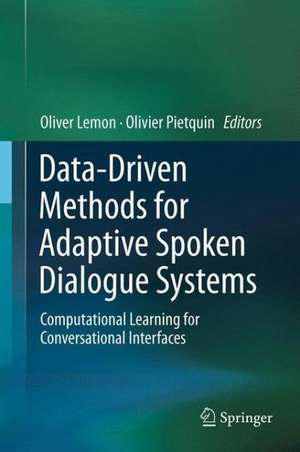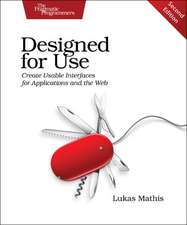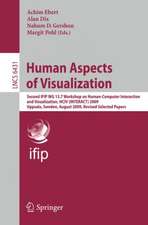Data-Driven Methods for Adaptive Spoken Dialogue Systems: Computational Learning for Conversational Interfaces
Editat de Oliver Lemon, Olivier Pietquinen Limba Engleză Hardback – 21 oct 2012
| Toate formatele și edițiile | Preț | Express |
|---|---|---|
| Paperback (1) | 640.19 lei 6-8 săpt. | |
| Springer – 9 noi 2014 | 640.19 lei 6-8 săpt. | |
| Hardback (1) | 648.44 lei 6-8 săpt. | |
| Springer – 21 oct 2012 | 648.44 lei 6-8 săpt. |
Preț: 648.44 lei
Preț vechi: 810.55 lei
-20% Nou
Puncte Express: 973
Preț estimativ în valută:
124.08€ • 129.90$ • 102.67£
124.08€ • 129.90$ • 102.67£
Carte tipărită la comandă
Livrare economică 05-19 aprilie
Preluare comenzi: 021 569.72.76
Specificații
ISBN-13: 9781461448020
ISBN-10: 1461448026
Pagini: 188
Ilustrații: X, 178 p.
Dimensiuni: 155 x 235 x 16 mm
Greutate: 0.5 kg
Ediția:2012
Editura: Springer
Colecția Springer
Locul publicării:New York, NY, United States
ISBN-10: 1461448026
Pagini: 188
Ilustrații: X, 178 p.
Dimensiuni: 155 x 235 x 16 mm
Greutate: 0.5 kg
Ediția:2012
Editura: Springer
Colecția Springer
Locul publicării:New York, NY, United States
Public țintă
ResearchCuprins
Chapter 1. Conversational Interfaces.- Chapter 2. Developing Dialogue Managers from Limited Amounts of Data.- Chapter 3. Data-Driven Methods for Spoken Language Understanding.- Chapter 4. User Simulation in the Development of Statistical Spoken Dialogue Systems.- Chapter 5. Optimisation for POMDP-based Spoken Dialogue Systems.- Chapter 6. Statistical Approaches to Adaptive Natural Language Generation.- Chapter 7. Metrics and Evaluation of Spoken Dialogue Systems.- Chapter 8. Data-Driven Methods in Industrial Spoken Dialog Systems.- Chapter 9. Future Research Directions.
Notă biografică
Oliver Lemon is a Reader and head of the Interaction Lab in the school of Mathematical and Computer Sciences at Heriot Watt University, Edinburgh. Dr. Lemon is currently serving as the Program Chair for SIGDial 2010 and as a member of the Program Committee of INLG 2010. He is also on the Editorial Board of the new journal "Dialogue & Discourse". Prof. Pietquin and Dr. Lemon were co-chairs of the special session "Machine learning for adaptivity in spoken dialogue systems" at the InterSpeech 2009 conference, which inspired the development of this book.
Olivier Pietquin is an Associate Professor at the Ecole Superieure d'Electricite (Supelec, France), where he founded and currently heads the "Information, Multimodality & Signal" (IMS) research group. He is an elected member of the IEEE Speech and Language Technical Committee. Prof. Pietquin has four patents and has been published in over 45 journal articles, edited books, and conference proceedings.
Olivier Pietquin is an Associate Professor at the Ecole Superieure d'Electricite (Supelec, France), where he founded and currently heads the "Information, Multimodality & Signal" (IMS) research group. He is an elected member of the IEEE Speech and Language Technical Committee. Prof. Pietquin has four patents and has been published in over 45 journal articles, edited books, and conference proceedings.
Textul de pe ultima copertă
The EC FP7 project “Computational Learning in Adaptive Systems for Spoken Conversation” (CLASSiC) was a European initiative working on a fully data-driven architecture for the development of conversational interfaces, as well as new machine learning approaches for their sub-components. It developed a variety of novel statistical methods for spoken dialogue processing, for extended conversational interaction, which are now collected together in this book. A major focus of the project was in tracking the accumulation of information about user goals over multiple dialogue turns (i.e.\ extended conversational interaction), and in maintaining overall system robustness even when speech recognition results contain errors, by managing uncertainty through the processing chain.
Other advances were made in the areas of adaptive natural language generation (NLG), statistical methods for spoken language understanding (SLU), and machine learning methods for system optimisation, either during online operation, simulation, or from small amounts of data.
This book collects together the main research results and lessons learned in the CLASSiC project. Each chapter provides a summary of the specific methods developed and results obtained in its particular research area. In addition, leading researchers in statistical methods applied to industrial-scale dialogue systems (from SpeechCycle) have contributed a chapter surveying their recent work.
This volume will serve as a valuable introduction to the current state-of-the-art in statistical approaches to developing conversational interfaces, for active researchers in the field in industry and academia, as well as for students who are considering working in this exciting area.
Other advances were made in the areas of adaptive natural language generation (NLG), statistical methods for spoken language understanding (SLU), and machine learning methods for system optimisation, either during online operation, simulation, or from small amounts of data.
This book collects together the main research results and lessons learned in the CLASSiC project. Each chapter provides a summary of the specific methods developed and results obtained in its particular research area. In addition, leading researchers in statistical methods applied to industrial-scale dialogue systems (from SpeechCycle) have contributed a chapter surveying their recent work.
This volume will serve as a valuable introduction to the current state-of-the-art in statistical approaches to developing conversational interfaces, for active researchers in the field in industry and academia, as well as for students who are considering working in this exciting area.
Caracteristici
One of the first books to specifically address adaptive techniques used in dialogue system development Practical examples developed by the editors and colleagues will be included The book will be based on dialogue systems freely available for academic use












